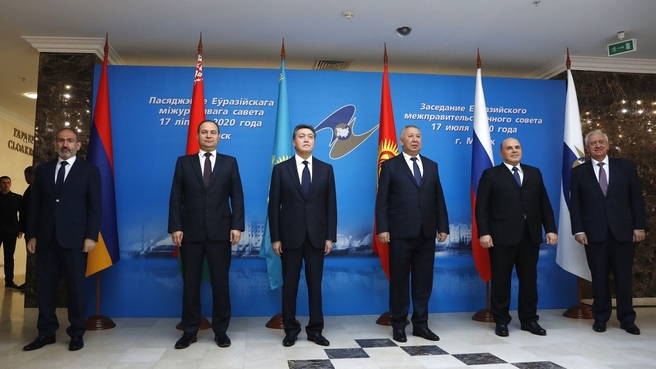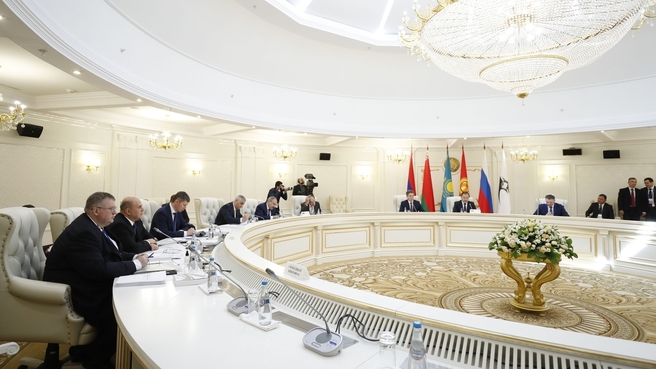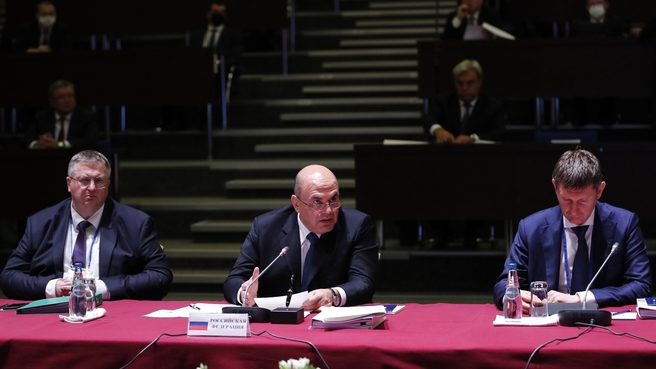The current issues of Eurasian Economic Union development were discussed, including removing barriers within the union’s internal market, improving mechanisms for applying protective measures, and building common markets for natural gas, oil and oil products.
Delegation heads taking part in the at Eurasian Intergovernmental Council meeting:
Prime Minister of the Republic of Armenia Nikol Pashinyan;
Prime Minister of the Republic of Belarus Roman Golovchenko;
Prime Minister of the Republic of Kazakhstan Askar Mamin;
Prime Minister of the Kyrgyz Republic Kubatbek Boronov;
Prime Minister of the Russian Federation Mikhail Mishustin;
Chairman of the Eurasian Economic Commission Board Mikhail Myasnikovich;
Prime Minister of the Republic of Moldova Ion Chicu.
Mikhail Mishustin’s remarks at the Eurasian Intergovernmental Council session
Greetings, esteemed colleagues,
First of all, I would like to welcome Prime Minister of Belarus Roman Golovchenko and Prime Minister of Kyrgyzstan Kubatbek Boronov, who are attending a session of the Eurasian Intergovernmental Council for the first time. I would also like to thank Mr Golovchenko and our Belarusian colleagues for this well organised meeting and for the very comfortable conditions.
It is the first time that we are holding a face-to-face meeting since January. This shows that the coronavirus infection, which has hit all of our countries, is rolling back. However, the fight against it is not yet over, which calls for our concerted efforts.
At this difficult period of time, the Eurasian Economic Union has proved capable of promptly responding to new challenges. In their joint statement issued on 14 April, the heads of our states agreed that our common priority was to act together against COVID-19. This is why our agenda today includes the adoption of a comprehensive action plan aimed at preventing the spread of the coronavirus infection and other infectious diseases throughout the EAEU member states.
At a practical level, Russia is ready to share its experience of its pandemic response. We are actively supporting our partners and we are planning mechanisms for interaction between the five member states, in particular, helping with upgrading the skills of medical and sanitary-epidemiological personnel. We will continue to send coronavirus test kits, reagents and non-contact temperature screening devices to them.
As a result of all the hard work done by Russian scientists and researchers, as well as the rapid response by our industries, we have launched the manufacturing of innovative coronavirus medicine. We have registered unique medications, such as Avifavir, as well as Artlegia (Olokizumab) and Ilsira (Levilimab), which prevent serious COVID-19 complications, the so-called cytokine storm. We have developed a full production cycle for thesemedicines and hence do not depend on imports. These medicines are available in Russia and they also have a good export potential. It is important that our specialists continue working on modern vaccine platforms, which have entered the stage of clinical trials that include volonteers.
Colleagues, we continue working on the draft Strategic Directions for Eurasian Economic Integration Development until 2025. In general, the draft was approved at a meeting of the Supreme Eurasian Economic Council held on 19 May 2020.
The EAEU governments and the Eurasian Commission have been instructed to review a number of the document’s provisions so that it could be adopted at the next meeting of our leaders to be held here, in Minsk, in the autumn.
The new strategy is to ensure four freedoms in the EAEU, that is, to remove the obstacles, exceptions and restrictions on the movement of goods, services, capital and workforce. One of our priorities is to create a labelling mechanism. We must create conditions for the implementation of the Agreement on the Labelling of Goods with Means of Identification, as well as the decisions of the commission’s council regarding the range of such goods.
Thanks to a pilot fur products labelling project, the volume of the legal fur products market has increased dramatically. We have identified some 85 percent of counterfeit fur products in Belarus, Kazakhstan and Russia. The volume of customs payments has increased several times over. Labelling other groups of commodities will protect our businesses from unfair competition, and will enable buyers an opportunity to inspect goods for safety and quality before buying them.
Another unresolved problem concerns the settlement of differences regarding the movement of goods across the borders of the EAEU states. We propose taking advantage of the breakthrough customs and fiscal instruments that are being used in Russia. We understand that this will call for taking system-wide measures, for example, a revision of customs procedures, the coordination of conditions for doing business, and the digitalisation of some procedures. We call on our partners to support this initiative within the framework of the concerned committee of the Eurasian Economic Commission. We will also discuss the legal framework and the design aspects of formulating the EAEU’s digital agenda, which Mr Askar Mamin has already mentioned here.
Our decisions have created a solid foundation for our joint efforts. Digitalisation projects have been launched in such crucial sectors as the industry, transport and the labour market.
The EEC is working on the Unified Search System “Work without borders” proposed by Russia. I believe it would be wise if the Eurasian Development Bank (EDB) joined this project. It is aimed at enabling every citizen or employer to search for vacancies or CVs across all of the EAEU countries. We also believe that it is important to create a special information system in the sphere of labour migration.
Colleagues, the EAEU’s field of attraction is expanding. I would like to say how much we appreciate the involvement of Moldova’s permanent representative in the work of the Eurasian Economic Commission. Cuba and Uzbekistan have filed official applications for the status of EAEU observer countries. We welcome this intention. We are ready to discuss any format of dialogue with our other partners, primarily the member countries of the Commonwealth of Independent States (CIS).
I would like to take advantage of this occasion to present the new chair of the EDB, Nikolai Podguzov, who was appointed as Chairman of the Bank’s Management Board on 29 June 2020. I am sure that under his guidance the Bank as our development institute should focus on the promotion of large-scale integration projects, primarily those of importance for the member states and first of all in the digital sphere.
Mr Podguzov has considerable experience in government administration and banking. He launched several major digitalisation projects at Russian Post, which have enhanced the quality and operational efficiency of our largest logistics operator in the region.
Colleagues, I have no doubt that our concerted efforts will help us overcome all the obstacles we are facing, including the spread of the coronavirus infection, and will enable us to move forward along the path of the further development and strengthening of Eurasian integration.
Documents signed following the meeting of the Eurasian Intergovernmental Council (EIC):
·Decision on the Results of Implementing EIC Instructions No. 18 adopted on 27 November 2018
·Directive on the implementation of the Agreement on the Labelling of Goods with Means of Identification in the EAEU, adopted on 2 February 2018, and the further development of the labelling system in the EAEU
·Instruction on the implementation of the Agreement on the Labelling of Goods with Means of Identification in the EAEU, adopted on 2 February 2018, and the further development of the labelling system in the EAEU (dairy products)
·Instruction on the implementation of EIC Iinstruction No. 10 adopted on 9 August 2019
·Directive on amending EIC Directive No. 2 adopted on 1 February 2019
·Directive on the annual EIC report on monitoring the assessment of the regulating influence of draft EIC decisions in 2019
·Decision on the intergovernmental programme “Integrated system of the EAEU member states for the production and provision of space and geo-information services based on the national remote Earth sensing data sources”
·Directive on the EAEU Agroindustry Development Map
·Directive on the EAEU Industrialisation Map
·Directive on the comprehensive action plan in the fields of healthcare and sanitary-epidemiological welfare of people aimed at preventing the spread of the COVID-19 infection and other infectious diseases throughout the EAEU member states
·Decision on not entering the customs agencies’ notes in the transportation (haulage), commercial and/or other documents during electronic customs transactions
·Decision on the commencement of Decision No. 126 of the EEC Board adopted on 23 July 2019
·Decision on amending Clause 2 of EIC Decision No. 2 adopted on 10 April 2020
·Directive regarding the time and place of the next meeting of the Eurasian Intergovernmental Council














